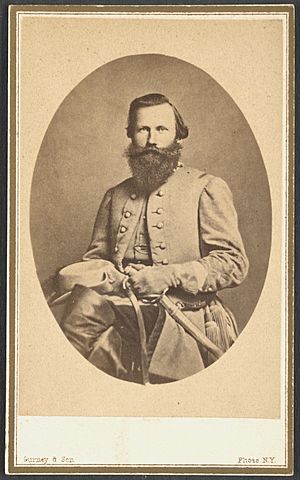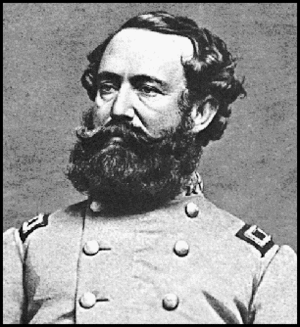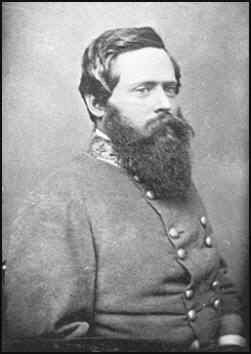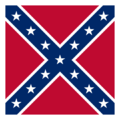Cavalry Corps, Army of Northern Virginia facts for kids
The Cavalry Corps of the Army of Northern Virginia was a special group of horse-riding soldiers in the Confederate Army. They played a big role during the American Civil War. This group started small in 1861 as a brigade (a small military unit). It grew into a division in 1862 and finally became a large Corps in 1863.
The Cavalry Corps fought in the Eastern part of the war. They served until the Army of Northern Virginia gave up in April 1865.
Contents
The Cavalry Corps: Early Days with J.E.B. Stuart
The Cavalry Corps became strong thanks to its first leader, Maj. Gen. J.E.B. Stuart. He was very good at organizing soldiers. Before the Army of Northern Virginia was even formed, cavalry units were small. They were just single regiments or smaller groups.
Stuart was promoted to brigadier general in September 1861. This happened because other important generals recommended him. After his promotion, a single cavalry brigade was formed under his command. This was the start of the Cavalry Corps.
The cavalry grew quickly. By August 1962, it became a division with four brigades. In September 1863, it was finally big enough to be called a Corps. It then had six brigades in two divisions.
Stuart's cavalry was known for its daring actions. They often rode around enemy armies. They also protected their own army. Here are some of their important battles and actions:
- Riding around General McClellan's army during the Peninsula Campaign.
- A raid on General Pope near the Rappahannock River.
- Defending Crampton's Gap during the Maryland Campaign.
- Another raid around McClellan's army after the Battle of Antietam.
- Fighting at the Battle of Fredericksburg.
- Playing a key role at the Battle of Chancellorsville. Stuart even led a larger army corps for a short time.
- The big cavalry battle at Battle of Brandy Station.
- Riding around General Meade's army during the Gettysburg Campaign.
- Protecting General Lee's army after the Battle of Gettysburg.
- Protecting Lee's army from General Sheridan in 1864.
J.E.B. Stuart died on May 11, 1864. After his death, the Cavalry Corps was split into two separate divisions. These were led by Generals Hampton and Fitz Lee.
Leading the Cavalry: Wade Hampton Takes Command
The next main leader of the Cavalry Corps was Wade Hampton III. He was a wealthy man from South Carolina. Hampton had been a senior commander under J.E.B. Stuart.
When the cavalry was split after Stuart's death, Hampton continued to lead his division. Then, on August 11, 1864, General Robert E. Lee brought the Cavalry Corps back together. He put Hampton in charge.
Hampton's cavalry fought in important battles. They often screened (protected) the main army. One famous fight was the Battle of Haw's Shop. Hampton also led his troops during the long Siege of Petersburg.
Later, General Lee sent Hampton and his Carolina cavalry units to South Carolina. This was to help defend against Maj. Gen. William T. Sherman's march. Hampton's cavalry fought to slow Sherman down.
Key battles under Hampton's leadership included:
- The Battle of Haw's Shop.
- The Battle of Trevilian Station.
- The famous Beefsteak Raid, where they captured many cattle.
- Fighting during the Siege of Petersburg.
The Final Commander: Fitzhugh Lee
When General Hampton left, Maj. Gen. Fitzhugh Lee took over the Cavalry Corps. This was in February 1865. The corps was smaller by this time.
Fitzhugh Lee led the cavalry during the final days of the war. They helped protect the army during the evacuation of Petersburg and Richmond. They also fought through the Appomattox Campaign.
Fitzhugh Lee's cavalry made the very last charge on April 9, 1865. This happened at Farmville, Virginia. Soon after, the Army of Northern Virginia surrendered.
Important Cavalry Leaders
Many brave officers served in the Cavalry Corps. Here are some of the most important commanders:
- J.E.B. Stuart – The first and most famous commander.
- Wade Hampton III – He took over after Stuart.
- Fitzhugh Lee – He led the corps at the very end of the war.
- W.H.F. "Rooney" Lee – Another important division commander.
- Thomas L. Rosser – A well-known division commander.
- Matthew C. Butler – A division commander.
- Thomas T. Munford – A division commander.
- Pierce M. B. Young – A division commander.
Images for kids
 | Emma Amos |
 | Edward Mitchell Bannister |
 | Larry D. Alexander |
 | Ernie Barnes |





